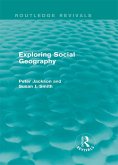Geographic Thought (eBook, PDF)
A Praxis Perspective
Redaktion: Henderson, George; Waterstone, Marvin
57,95 €
57,95 €
inkl. MwSt.
Sofort per Download lieferbar

29 °P sammeln
57,95 €
Als Download kaufen

57,95 €
inkl. MwSt.
Sofort per Download lieferbar

29 °P sammeln
Jetzt verschenken
Alle Infos zum eBook verschenken
57,95 €
inkl. MwSt.
Sofort per Download lieferbar
Alle Infos zum eBook verschenken

29 °P sammeln
Geographic Thought (eBook, PDF)
A Praxis Perspective
Redaktion: Henderson, George; Waterstone, Marvin
- Format: PDF
- Merkliste
- Auf die Merkliste
- Bewerten Bewerten
- Teilen
- Produkt teilen
- Produkterinnerung
- Produkterinnerung

Bitte loggen Sie sich zunächst in Ihr Kundenkonto ein oder registrieren Sie sich bei
bücher.de, um das eBook-Abo tolino select nutzen zu können.
Hier können Sie sich einloggen
Hier können Sie sich einloggen
Sie sind bereits eingeloggt. Klicken Sie auf 2. tolino select Abo, um fortzufahren.

Bitte loggen Sie sich zunächst in Ihr Kundenkonto ein oder registrieren Sie sich bei bücher.de, um das eBook-Abo tolino select nutzen zu können.
This unabridged reader offers a fresh approach to learning about Geographic Thought by showing, through concrete examples and detailed editorial essays, how the discipline has been forever altered by the rise of progressive social struggles of the last 30 years.
- Geräte: PC
- mit Kopierschutz
- eBook Hilfe
- Größe: 5.89MB
Andere Kunden interessierten sich auch für
![Shopping, Place and Identity (eBook, PDF) Shopping, Place and Identity (eBook, PDF)]() Peter JacksonShopping, Place and Identity (eBook, PDF)49,95 €
Peter JacksonShopping, Place and Identity (eBook, PDF)49,95 €![An Introduction to Tourism and Anthropology (eBook, PDF) An Introduction to Tourism and Anthropology (eBook, PDF)]() Peter BurnsAn Introduction to Tourism and Anthropology (eBook, PDF)57,95 €
Peter BurnsAn Introduction to Tourism and Anthropology (eBook, PDF)57,95 €![Living with Tourism (eBook, PDF) Living with Tourism (eBook, PDF)]() Hazel TuckerLiving with Tourism (eBook, PDF)45,95 €
Hazel TuckerLiving with Tourism (eBook, PDF)45,95 €![Accident And Design (eBook, PDF) Accident And Design (eBook, PDF)]() Accident And Design (eBook, PDF)49,95 €
Accident And Design (eBook, PDF)49,95 €![Exploring Social Geography (Routledge Revivals) (eBook, PDF) Exploring Social Geography (Routledge Revivals) (eBook, PDF)]() Peter A. JacksonExploring Social Geography (Routledge Revivals) (eBook, PDF)39,95 €
Peter A. JacksonExploring Social Geography (Routledge Revivals) (eBook, PDF)39,95 €![Routledge Handbook of Sustainable Heritage (eBook, PDF) Routledge Handbook of Sustainable Heritage (eBook, PDF)]() Routledge Handbook of Sustainable Heritage (eBook, PDF)46,95 €
Routledge Handbook of Sustainable Heritage (eBook, PDF)46,95 €![Technical Knowledge and Development (eBook, PDF) Technical Knowledge and Development (eBook, PDF)]() Thomas GrammigTechnical Knowledge and Development (eBook, PDF)15,95 €
Thomas GrammigTechnical Knowledge and Development (eBook, PDF)15,95 €-
-
-
This unabridged reader offers a fresh approach to learning about Geographic Thought by showing, through concrete examples and detailed editorial essays, how the discipline has been forever altered by the rise of progressive social struggles of the last 30 years.
Dieser Download kann aus rechtlichen Gründen nur mit Rechnungsadresse in A, B, BG, CY, CZ, D, DK, EW, E, FIN, F, GR, HR, H, IRL, I, LT, L, LR, M, NL, PL, P, R, S, SLO, SK ausgeliefert werden.
Produktdetails
- Produktdetails
- Verlag: Taylor & Francis
- Seitenzahl: 400
- Erscheinungstermin: 28. August 2008
- Englisch
- ISBN-13: 9781134029440
- Artikelnr.: 38247710
- Verlag: Taylor & Francis
- Seitenzahl: 400
- Erscheinungstermin: 28. August 2008
- Englisch
- ISBN-13: 9781134029440
- Artikelnr.: 38247710
- Herstellerkennzeichnung Die Herstellerinformationen sind derzeit nicht verfügbar.
George Henderson is a human geographer who teaches and writes about the political economy of American capitalism. He is the author of the book California and the Fictions of Capital (Temple University Press paperback, 2003) and is Associate Professor of Geography at the University of Minnesota. Marv Waterstone is Associate Professor of Geography at the University of Arizona. He was also the Director of the University of Arizona's Interdisciplinary Graduate Program in Comparative Cultural and Literary Studies. His current teaching includes History of Geographic Thought, Risk and Society, Radical Geography, Geography and Social Justice, Environmental and Resource Geography, and Governing Science and Technology.
Section 1: The Politics of Geographic Thought Introduction: Why is
Geographic Thought Always Political? 1. Revolutionary and
Counter-revolutionary Theory in Geography and the Problem of Ghetto
Formation (DAVID HARVEY) 2. Geographic Models of Imperialism (JAMES BLAUT)
3. On Not Excluding Half of the Human in Human Geography (JANICE MONK and
SUSAN HANSON) Section 2: Staking Claims Introduction: Moral Knowledge,
Geographical Knowledge: What Does it Mean to Claim Moral Ground, or How is
Oppression to be Recognized? Part One: Characterizing Oppressions and
Recognizing Injustice Introduction 4. Five Faces of Oppression (IRIS MARION
YOUNG) 5. Social Justice in the Age of Identity Politics: Redistribution,
Recognition, and Participation (NANCY FRASER) Part Two: Making Justice
Spatial Introduction 6. Moral Progress in Human Geography: Transcending the
Place of Good Fortune (DAVID SMITH) 7. Dissecting the Autonomous Self:
Hybrid Cartographies For A Relational Ethics (SARAH WHATMORE) Part Three:
Practicing Politicized Geographic Thought Introduction 8. Maps, Knowledge,
and Power (J. BRIAN HARLEY) 9. Collaboration Across Borders: Moving Beyond
Positionality (RICHA NAGAR, with FARAH ALI) 10. Research, Pedagogy, and
Instrumental Geography (RICH HEYMAN) 11. Situated Knowledge Through
Exploration: Reflections on Bunge's 'Geographic Expeditions' (ANDY
MERRIFIELD) Section 3: Goals and Arenas of Struggle: What is to be gained
and How? Introduction: The Embeddedness of Intentions, Tactics, and
Strategies in Rights-, Justice-, and Ethics-based Worldviews Part One:
Rights-based Goals Introduction 12. Mobility, Empowerment and the Rights
Revolution (NICHOLAS BLOMLEY) 13. Human Rights and Development in Africa:
Moral Intrusion or Empowering Opportunity? (GILES MOHAN and JEREMY HOLLAND)
14. New World Warriors: 'nation' and 'state' in the Politics of Zapatista
and US Patriot Movements (CAROLYN GALLAHER and OLIVER FROEHLING) 15. Social
Theory and the De/reconstruction of Agricultural Science: Local Knowledge
for an Alternative Agriculture (JACK KLOPPENBERG, JR.) Part Two:
Justice-based Goals Introduction 16. Restructuring the Contraction and
Expansion of Environmental Rights in the United States (LAURA PULIDO) 17.
Environmental Justice and American Indian Tribal Sovereignty: Case Study of
a Land-use Conflict in Skull Valley, Utah (NORIKO ISHIYAMA) 18. Structural
Power, Agency, and National Liberation: The Case of East Timor (JAMES
GLASSMAN) Part Three: Ethics-based Goals Introduction 19. Post-Marxism:
Democracy and Identity (CHANTAL MOUFFE) 20. U.S. Third World Feminism: The
Theory and Method of the Oppositional Consciousness in the Postmodern World
(CHELA SANDOVAL) 21. An Ethics of the Local (J. K. GIBSON-GRAHAM)
Geographic Thought Always Political? 1. Revolutionary and
Counter-revolutionary Theory in Geography and the Problem of Ghetto
Formation (DAVID HARVEY) 2. Geographic Models of Imperialism (JAMES BLAUT)
3. On Not Excluding Half of the Human in Human Geography (JANICE MONK and
SUSAN HANSON) Section 2: Staking Claims Introduction: Moral Knowledge,
Geographical Knowledge: What Does it Mean to Claim Moral Ground, or How is
Oppression to be Recognized? Part One: Characterizing Oppressions and
Recognizing Injustice Introduction 4. Five Faces of Oppression (IRIS MARION
YOUNG) 5. Social Justice in the Age of Identity Politics: Redistribution,
Recognition, and Participation (NANCY FRASER) Part Two: Making Justice
Spatial Introduction 6. Moral Progress in Human Geography: Transcending the
Place of Good Fortune (DAVID SMITH) 7. Dissecting the Autonomous Self:
Hybrid Cartographies For A Relational Ethics (SARAH WHATMORE) Part Three:
Practicing Politicized Geographic Thought Introduction 8. Maps, Knowledge,
and Power (J. BRIAN HARLEY) 9. Collaboration Across Borders: Moving Beyond
Positionality (RICHA NAGAR, with FARAH ALI) 10. Research, Pedagogy, and
Instrumental Geography (RICH HEYMAN) 11. Situated Knowledge Through
Exploration: Reflections on Bunge's 'Geographic Expeditions' (ANDY
MERRIFIELD) Section 3: Goals and Arenas of Struggle: What is to be gained
and How? Introduction: The Embeddedness of Intentions, Tactics, and
Strategies in Rights-, Justice-, and Ethics-based Worldviews Part One:
Rights-based Goals Introduction 12. Mobility, Empowerment and the Rights
Revolution (NICHOLAS BLOMLEY) 13. Human Rights and Development in Africa:
Moral Intrusion or Empowering Opportunity? (GILES MOHAN and JEREMY HOLLAND)
14. New World Warriors: 'nation' and 'state' in the Politics of Zapatista
and US Patriot Movements (CAROLYN GALLAHER and OLIVER FROEHLING) 15. Social
Theory and the De/reconstruction of Agricultural Science: Local Knowledge
for an Alternative Agriculture (JACK KLOPPENBERG, JR.) Part Two:
Justice-based Goals Introduction 16. Restructuring the Contraction and
Expansion of Environmental Rights in the United States (LAURA PULIDO) 17.
Environmental Justice and American Indian Tribal Sovereignty: Case Study of
a Land-use Conflict in Skull Valley, Utah (NORIKO ISHIYAMA) 18. Structural
Power, Agency, and National Liberation: The Case of East Timor (JAMES
GLASSMAN) Part Three: Ethics-based Goals Introduction 19. Post-Marxism:
Democracy and Identity (CHANTAL MOUFFE) 20. U.S. Third World Feminism: The
Theory and Method of the Oppositional Consciousness in the Postmodern World
(CHELA SANDOVAL) 21. An Ethics of the Local (J. K. GIBSON-GRAHAM)
Section 1: The Politics of Geographic Thought Introduction: Why is
Geographic Thought Always Political? 1. Revolutionary and
Counter-revolutionary Theory in Geography and the Problem of Ghetto
Formation (DAVID HARVEY) 2. Geographic Models of Imperialism (JAMES BLAUT)
3. On Not Excluding Half of the Human in Human Geography (JANICE MONK and
SUSAN HANSON) Section 2: Staking Claims Introduction: Moral Knowledge,
Geographical Knowledge: What Does it Mean to Claim Moral Ground, or How is
Oppression to be Recognized? Part One: Characterizing Oppressions and
Recognizing Injustice Introduction 4. Five Faces of Oppression (IRIS MARION
YOUNG) 5. Social Justice in the Age of Identity Politics: Redistribution,
Recognition, and Participation (NANCY FRASER) Part Two: Making Justice
Spatial Introduction 6. Moral Progress in Human Geography: Transcending the
Place of Good Fortune (DAVID SMITH) 7. Dissecting the Autonomous Self:
Hybrid Cartographies For A Relational Ethics (SARAH WHATMORE) Part Three:
Practicing Politicized Geographic Thought Introduction 8. Maps, Knowledge,
and Power (J. BRIAN HARLEY) 9. Collaboration Across Borders: Moving Beyond
Positionality (RICHA NAGAR, with FARAH ALI) 10. Research, Pedagogy, and
Instrumental Geography (RICH HEYMAN) 11. Situated Knowledge Through
Exploration: Reflections on Bunge's 'Geographic Expeditions' (ANDY
MERRIFIELD) Section 3: Goals and Arenas of Struggle: What is to be gained
and How? Introduction: The Embeddedness of Intentions, Tactics, and
Strategies in Rights-, Justice-, and Ethics-based Worldviews Part One:
Rights-based Goals Introduction 12. Mobility, Empowerment and the Rights
Revolution (NICHOLAS BLOMLEY) 13. Human Rights and Development in Africa:
Moral Intrusion or Empowering Opportunity? (GILES MOHAN and JEREMY HOLLAND)
14. New World Warriors: 'nation' and 'state' in the Politics of Zapatista
and US Patriot Movements (CAROLYN GALLAHER and OLIVER FROEHLING) 15. Social
Theory and the De/reconstruction of Agricultural Science: Local Knowledge
for an Alternative Agriculture (JACK KLOPPENBERG, JR.) Part Two:
Justice-based Goals Introduction 16. Restructuring the Contraction and
Expansion of Environmental Rights in the United States (LAURA PULIDO) 17.
Environmental Justice and American Indian Tribal Sovereignty: Case Study of
a Land-use Conflict in Skull Valley, Utah (NORIKO ISHIYAMA) 18. Structural
Power, Agency, and National Liberation: The Case of East Timor (JAMES
GLASSMAN) Part Three: Ethics-based Goals Introduction 19. Post-Marxism:
Democracy and Identity (CHANTAL MOUFFE) 20. U.S. Third World Feminism: The
Theory and Method of the Oppositional Consciousness in the Postmodern World
(CHELA SANDOVAL) 21. An Ethics of the Local (J. K. GIBSON-GRAHAM)
Geographic Thought Always Political? 1. Revolutionary and
Counter-revolutionary Theory in Geography and the Problem of Ghetto
Formation (DAVID HARVEY) 2. Geographic Models of Imperialism (JAMES BLAUT)
3. On Not Excluding Half of the Human in Human Geography (JANICE MONK and
SUSAN HANSON) Section 2: Staking Claims Introduction: Moral Knowledge,
Geographical Knowledge: What Does it Mean to Claim Moral Ground, or How is
Oppression to be Recognized? Part One: Characterizing Oppressions and
Recognizing Injustice Introduction 4. Five Faces of Oppression (IRIS MARION
YOUNG) 5. Social Justice in the Age of Identity Politics: Redistribution,
Recognition, and Participation (NANCY FRASER) Part Two: Making Justice
Spatial Introduction 6. Moral Progress in Human Geography: Transcending the
Place of Good Fortune (DAVID SMITH) 7. Dissecting the Autonomous Self:
Hybrid Cartographies For A Relational Ethics (SARAH WHATMORE) Part Three:
Practicing Politicized Geographic Thought Introduction 8. Maps, Knowledge,
and Power (J. BRIAN HARLEY) 9. Collaboration Across Borders: Moving Beyond
Positionality (RICHA NAGAR, with FARAH ALI) 10. Research, Pedagogy, and
Instrumental Geography (RICH HEYMAN) 11. Situated Knowledge Through
Exploration: Reflections on Bunge's 'Geographic Expeditions' (ANDY
MERRIFIELD) Section 3: Goals and Arenas of Struggle: What is to be gained
and How? Introduction: The Embeddedness of Intentions, Tactics, and
Strategies in Rights-, Justice-, and Ethics-based Worldviews Part One:
Rights-based Goals Introduction 12. Mobility, Empowerment and the Rights
Revolution (NICHOLAS BLOMLEY) 13. Human Rights and Development in Africa:
Moral Intrusion or Empowering Opportunity? (GILES MOHAN and JEREMY HOLLAND)
14. New World Warriors: 'nation' and 'state' in the Politics of Zapatista
and US Patriot Movements (CAROLYN GALLAHER and OLIVER FROEHLING) 15. Social
Theory and the De/reconstruction of Agricultural Science: Local Knowledge
for an Alternative Agriculture (JACK KLOPPENBERG, JR.) Part Two:
Justice-based Goals Introduction 16. Restructuring the Contraction and
Expansion of Environmental Rights in the United States (LAURA PULIDO) 17.
Environmental Justice and American Indian Tribal Sovereignty: Case Study of
a Land-use Conflict in Skull Valley, Utah (NORIKO ISHIYAMA) 18. Structural
Power, Agency, and National Liberation: The Case of East Timor (JAMES
GLASSMAN) Part Three: Ethics-based Goals Introduction 19. Post-Marxism:
Democracy and Identity (CHANTAL MOUFFE) 20. U.S. Third World Feminism: The
Theory and Method of the Oppositional Consciousness in the Postmodern World
(CHELA SANDOVAL) 21. An Ethics of the Local (J. K. GIBSON-GRAHAM)







